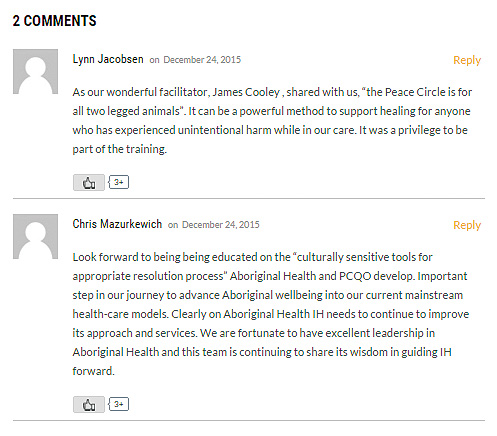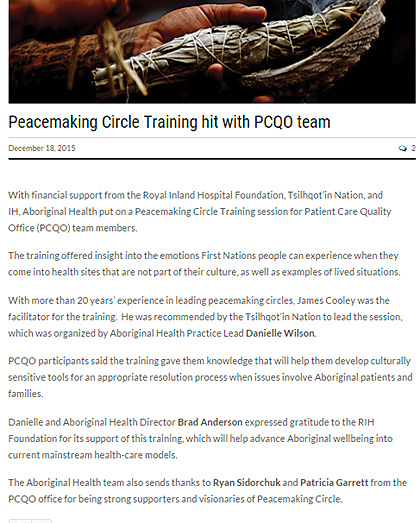
Overview
Interior Health developed a Talking Circle process to resolve First Nations and Aboriginal client health-care complaints. Aboriginal clients are less likely to submit complaints to the Patient Care Quality Office (PCQO) than other patient groups. With this in mind, the Talking Circle process is intended to provide a supportive and culturally safe space in which Aboriginal clients feel comfortable voicing concerns about their health-care services and experiences.


How Did This Initiative Come About?
Tsilhqot’in Health Directors and Interior Health staff discussed patient complaints and the patient complaint process in a Letter of Understanding meeting. This discussion explored the intimidating nature of the complaint process for members of the Tsilhqot’in Nation. They also discussed barriers to access and the lack of information about the program. A Health Director who had recently participated in peacemak-ing circle training (which is part of the Restorative Justice process) suggested this practice might be used and modified to support Aboriginal clients in the complaint process.
Funding from the Royal Inland Hospital Foundation supported the training of all members of the PCQO as well as the Aboriginal Cultural Safety Educator for Interior Health. The intent is that the Aboriginal Cultural Safety Educator will lead the Talking Circles, with the PCQOs supporting the process.
Outcomes
The Talking Circles are intended to improve health-care services for Aboriginal clients by better identifying those areas where the health-care system fails to adequately meet their needs. Through the use of the Talking Circle process, Interior Health hopes to receive more health-care complaints than it currently does. With this information, the organization will have a broader view of the opportunities for systemic change that can improve health-care services for Aboriginal clients.
Staff changeover at PCQO has led to fluctuating support for the program and delayed the imple-mentation of the Talking Circle process. Interior Health is currently discussing piloting the Talking Circle process with one PCQO and the Aboriginal Cultural Safety Educator and to then evaluate the pilot program.
Advice For Others
• Ensure Aboriginal stakeholders are engaged in and supportive of the process from the beginning.
• Once support is obtained from stakeholders and the health authority, develop a policy for using Talking Circles to minimize any delays or limitations caused by staff changeover.
For more information on this initiative, please contact:
Danielle Wilson
Vanessa Mitchell
Download this case study in PDF format here (559 KB)
